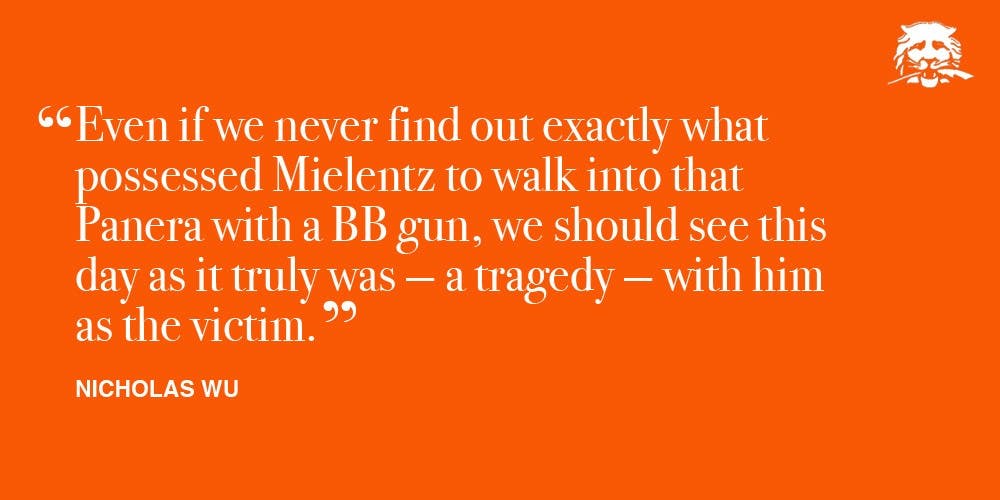My sister Maddie texted me at 10:41 a.m. “Don’t come to Nassau right now. There’s cops behind their cars with guns I can’t go outside.”
Maddie was stuck in Frutta Bowls, perhaps the epitome of the safe, innocuous Princeton bubble, just a few doors down from Panera, where a man had just entered with what the police had assumed was a gun. Shops up and down Nassau Street were all locked down. Maddie was released after about an hour, but the standoff continued for the rest of the afternoon.
For that first hour, there wasn’t much information about the standoff other than what I could find on Twitter, or the updates texted along by my sister. The initial reports of the ordeal entirely missed the mark, ranging from tweets about multiple shots in Panera, even to rumors that hostages had been taken. It didn’t help when I received an erroneously sent message from the University’s emergency alert system ordering everyone to shelter in place after shots were fired in Panera. The armed standoff continued for several more hours, until the gunman was finally shot dead by police. And then it was all over, leaving us only with questions.
So, what are we to make of that shooting? What actually happened in Panera that day is much more complicated that it first seemed. It wasn’t just an act of gun violence by a deranged man. Instead, it seems to be something much more tragic — and it shouldn’t be forgotten.
By the time you read this column, you might already have seen the surveillance videos of Scott Mielentz’s death. We still don’t know a whole lot about his motives, or what actually led him to enter the Panera that one day, but we do know how it all ended — he was shot dead by police. The State Attorney General’s Office has been rather reluctant to release any details about the shooting, other than the video showing the police shooting Mielentz as he raised a weapon at them. Yet, we do know that Mielentz was only holding a BB gun, not a real gun, when police shot him dead, only adding to the tragedy.
What makes this particular episode interesting, though, and why I say that it’s more than a simple act of gun violence, is that no other people were injured during the incident. Mielentz released all of the customers and staff from Panera and did not fire on anyone. He had a BB gun, not a real gun. And when you dig into the details of Mielentz’s life, things get even stranger.
Some outlets have speculated that his actions were spurred by financial trouble. According to documents obtained by centraljersey.com, he had recently filed for bankruptcy, and was in arrears with the Social Security Administration. Yet, still others speculated that this was an outburst of Post-Traumatic Stress Disorder. His attorney had written in documents that Mielentz had been an Army veteran in the Rangers serving in Laos, now suffering from PTSD, but that story doesn’t hold up. The earliest he could have enlisted in the military was in 1979. The Vietnam War ended in 1975.
So, what we’re left with is simply more questions, and it’s incumbent on good journalists to dig further, and for the State Attorney General’s office to release more information on the exact circumstances of the shooting on March 20. For our community’s part, Princeton seems to want to sweep the memory of the shooting away. A window was shot out in the Panera on the day of the shooting; it was replaced by evening the next day, as I walked by. And then a week later, Panera reopened, as if nothing had ever happened. “We remodeled,” read a cheery sign outside the storefront read.

So how should we remember this? A few days after the shooting, someone scrawled a message in chalk outside Panera: “[Y]et all he wanted was one last cup of coffee. Asked everyone to leave so he wouldn’t hurt anyone and could have a cup in peace.” Perhaps he was an individual out of touch with the world — a lonely person with whom we can sympathize. Maybe he was just an individual striving for peace. Even if we never find out exactly what possessed Mielentz to walk into that Panera with a BB gun, we should see this day as it truly was — a tragedy — with him as the victim.
Nicholas Wu is a senior in the Wilson School from Grosse Pointe Shores, Mich. He can be reached at nmwu@princeton.edu.









